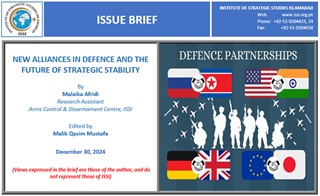Formal agreements between states to cooperate in the military domain have existed since the dawn of the century and have been a recurring feature in international relations. Being an important element of power politics, alliances are believed to play a significant role in maintaining peace and security.[1] More importantly, their role in deterring and minimizing the likelihood of conflict has been often highlighted. Throughout the years, states have formed alliances with a range of different aims in mind. States have entered into alliances based on common military and political aims, often by the use of force against adversaries. It has been argued that military alliances are often incorporated into “forward defence” strategies by states possessing more power.[2] States possessing lesser power, on the other hand, become part of military alliances to strengthen their defence capabilities, and secure economic benefits. Similarly, the present year has witnessed a series of newly emerged defence alliances, treaties, and pacts in multiple regions of the globe involving prominent state actors. Defence cooperation among these states signals an interesting shift in the geopolitical landscape, which ultimately influences strategic stability.
Home ISSI Publications Articles Issue Briefs Issue Brief on “New Alliances in Defence and the Future of Strategic...















